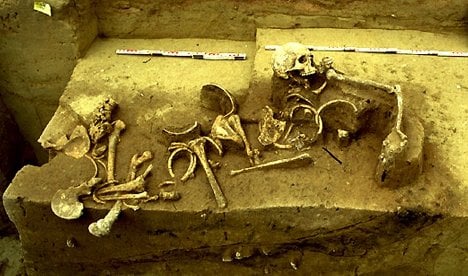The grisly scene was uncovered by a Franco-German team of archaeologists at Herxheim, in the southwest of the country, the journal reported.
The team, led by Bruno Boulestin of France’s Bordeaux University, uncovered a central enclosure about 250 metres in diameter with the “butchered remains of human beings” in a series of elongated pits, it reported.
The victims at the Rhineland-Palatinate site were adults, children and even babies.
“The human remains discovered so far belong to about 500 individuals, but since the area excavated corresponds to barely half the enclosure, we can assume that in fact more than 1,000 individuals were involved,” the study said.
An examination of the bones suggested that the victims had been cut up in much the same way animals were when they were butchered at this time in history, it added.
The carnage dated back to the Neolithic era – between 5,300 and 4,950 BC, a period “marked by war, sacrificial practices and every other form of social violence.”
Although cannibalism remained a rare phenomenon during this era – and prehistory in general – it was “probably underestimated due to the difficulties of recognising and demonstrating it,” the paper added.
Since the team also found pottery identified as being from several thousand miles away, they concluded that the site had been a key political and religious centre.
It also suggested that the find could be evidence of a deep crisis at the end of one prehistoric period.
“The existence of slaughters, of possible sacrificial practices, of wars and every other form of social violence fits well with the hypothesis of a millenarist crisis at the end of a cycle,” the study concluded.


 Please whitelist us to continue reading.
Please whitelist us to continue reading.
Member comments